Masha du Toit is an African writer of science fiction and fantasy. She was a finalist in 2017 and 2018 for a Nommo Award, a literary award presented by the African Speculative Fiction Society.
See Nommo Award. Masha and I met some years ago on the social media platform Google Plus (G+).
See Nommo Award. Masha and I met some years ago on the social media platform Google Plus (G+).
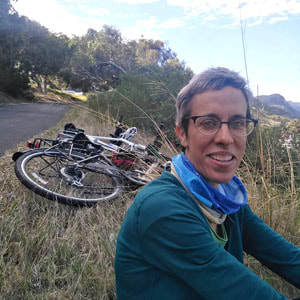
Masha, you are South African from Cape Town. Please tell us a little about yourself and your life on the other side of the world.
That's right. I live in Cape Town, in an area called Muizenberg which is right on the coast, a famous surf spot with a beautiful nature reserve estuary that's within walking distance of my home. A wonderful place to walk dogs, with so many birds, and other small wildlife. I recently started learning to paddle the kayak, so I have a whole new view on the area from the water these days.
I teach online to make a living (writing fiction doesn't pay enough!) so I was working from home long before the pandemic. My husband Brendon teaches design at a school for the deaf. He's an artist and musician too, although these days all his creative energy is being consumed by teaching.
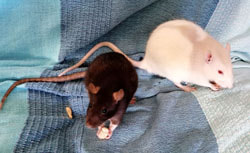 Frankie (left) and Maurice (right)
Frankie (left) and Maurice (right) My beloved dog Pippin died more than a year ago and my heart is still not ready for another dog. But in the meantime I have two lovely rats, Maurice and Frankie, who entertain me with their sweet, clever, gentle ways.
I know you’ve written fantasy stories in the past. Your most recent books have all been science fiction. Prior to We Broke the Moon, you wrote the Linked Worlds trilogy which began with The Babylon Eye. Why do you think you chose sci-fi as your chosen genre? Or did it choose you?
I've always loved reading sci-fi, even when I was too young to really understand a lot of it. Probably because my older brother Andries always made the books he was reading, like Dune, sound so fascinating. I actually find both fantasy and science fiction equally compelling as genres. One of the reasons I introduced the virtual reality game that the characters play in We Broke the Moon, is so that I would have a chance to write more fantastical scenes featuring monsters and magic. So in some ways, We Broke the Moon is a crossover between science-fiction and fantasy.
I know you’ve written fantasy stories in the past. Your most recent books have all been science fiction. Prior to We Broke the Moon, you wrote the Linked Worlds trilogy which began with The Babylon Eye. Why do you think you chose sci-fi as your chosen genre? Or did it choose you?
I've always loved reading sci-fi, even when I was too young to really understand a lot of it. Probably because my older brother Andries always made the books he was reading, like Dune, sound so fascinating. I actually find both fantasy and science fiction equally compelling as genres. One of the reasons I introduced the virtual reality game that the characters play in We Broke the Moon, is so that I would have a chance to write more fantastical scenes featuring monsters and magic. So in some ways, We Broke the Moon is a crossover between science-fiction and fantasy.
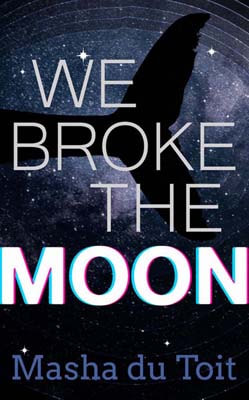
Science fiction allows me to explore themes such as how our technology reveals who we are, and how it changes us. Our technology is not neutral, but it's also not evil. I hope my stories don't fall into the "beware the killer robots will take over" trope of so much sci-fi. Our inventions are extensions of ourselves. While we've done a lot of damage to the world in the name of technological progress, I hope that we can use our inventions to fix the mess we've created.
In We Broke the Moon, we find ourselves on a giant korf ship floating through space after the humans onboard fled Earth as a result of the AI Wars. The korf ship is accompanied by fleets of smaller space ships, Brommer and Jatai ships. The humans on the korf ship have put severe limitations on the ship’s artificial intelligence (AI) system because they deeply fear releasing an AI system like the one they fled, a system that had become psychopathic and had attempted to kill all the humans. The human relationship to artificial intelligence (AI) systems is a major theme of We Broke the Moon. Tell us about your interest in artificial intelligence and how this interest came about.
I am fascinated by the way that we are both increasingly dependent on technology to survive and express ourselves, and yet we are also so deeply distrustful of it. Our technology has long been an extension of ourselves - think of how books and writing have increased our ability to store and transmit information for centuries, now. Books are part our minds and memories in a very real sense.
Added to that our tendency to anthropomorphize objects and imbue them with life and personality, and the idea of sentient artificial intelligence becomes quite interesting. What if we can artificially create a sentient, self-aware being? Is it truly alive, in the same way that we are? Can it suffer? What does freedom mean, when you can code an intelligence within limits you decide upon? What rights does such a being have? How does that reflect our ideas about human, and animal suffering, and human, and animal rights? The questions are endless.
In We Broke the Moon, the characters are even more dependent on tech than we are, being on a ship in deep space. They have the same uneasy relationship with that technology. They are trapped in that situation, forced to confront this essential contradiction, or their tech that both sustains and threatens them. Maybe that is something we have to face too. Our technology gives us the power to change the world. We have to take on that responsibility, to try the best we can to answer the unanswerable questions we've created.
Your two main protagonists, Maksim and Io, are teenagers who are attempting to define themselves as well as find their place in the post-Earth world of the korf ship. Why did you decide to go with teens as protagonists?
Teenagers are fun to write because, by definition, they are going through such big changes. They are figuring out who they are in the world. They look at the world in a fresh way, deciding what they value, and what they want to change. That gives me, as a writer, the chance to explore the world in a way that might not be possible through the eyes of a more jaded, older character.
I also wanted to show the different generations' attitudes to technology. The adults, who have directly experienced the harm technology can do, are much more distrustful of it. The teenagers, less risk-averse, are more trusting of new experiences, more curious. Impulsive characters are a gift to a story teller! They make things happen.
A key activity that these teens do for relaxation is to enter virtual reality settings to play games and engage in adventures. These virtual reality scenarios are very realistic and at the same time, fantastical. How did you manage to write so well about virtual reality?
The virtual reality game was my gift to myself as a writer who enjoys writing fantasy. Science fiction, especially when set on a deep-space ship, can easily become claustrophobic and limiting. Apart from the closed-off spaces inhabited by the characters, as a sci-fi writer you have to obey the rules of physics at least to some degree. The VR game allowed me to create luscious, expansive, immersive environments, and fantastical creatures. I tried to remember what it felt like, the first time I read stories of Narnia and Middle Earth. To conjure up that same sense of wonder, and create an immersive world to transport the reader out of their own reality. That was my hope!
The blurb of We Broke the Moon describes the book as “Hope Punk Science Fiction, a genre that focuses on friendship, love, and a hopeful, can-do approach to the challenges the characters face.” I did a little research and found that Hope Punk is defined as “weaponized optimism.” It has also been described as “part of a wider cultural and storytelling trend toward optimism and positivity in the face of bleak times.” Tell us about your view of Hope Punk and about your interest in writing in this manner.
I've become increasingly aware of the importance of stories. We humans constantly create and recreate our reality through narrative. The stories we tell ourselves about who we are, and why do what we do, to make sense of chaotic and unpredictable reality.
Stories are essential to us. I understand the value of dark, cynical and grim stories, but I don't enjoy them. My ability to put myself in the story, to empathise with the characters is just too strong. I don't have the ironic detachment needed to enjoy tales of treachery and cruelty.
Life is hard and lonely at times. There's not much I can do to make things better. But as a writer, I might be able to create a small escape for a reader, to remind them of the power of friendship and kindness, so that after closing the book, they can go back into their life with a bit more hope, and strength, to face the challenges out there. That's what hope punk is for me. Not to create a sugar-coated version of the world - my stories do contain pain and sadness as well. Hope punk is about facing that darkness, holding up a small light in the knowledge that you are not alone.
Another theme in the book is the human relationship to the natural world. By that, we mean the natural world of Earth which humans on the korf ship no longer experience directly. What are you attempting to convey in this rather subtle theme?
The tension between human and nature is in all of my stories. Humans are part of the natural world, but we try to separate ourselves from it, to deny our animal nature. We do so much harm to the environment that keeps us alive. We feel so lonely, we are so proud of our unique abilities, and yet we are surrounded by creatures who are not so different from us. It's fascinating to look into the eyes of a dog, or a crow, or an octopus, and try to imagine how they see us.
We Broke the Moon is a sad book in some ways, as the humans are forever separated from Earth, the world that shaped us as a species. I hope to remind my readers that we are not there yet. We are still flying through space on the most magnificent of space-ships, the planet Earth, a self-sustaining life support system that will always continue surprising and delighting us, no matter how long we explore it.
In We Broke the Moon, we find ourselves on a giant korf ship floating through space after the humans onboard fled Earth as a result of the AI Wars. The korf ship is accompanied by fleets of smaller space ships, Brommer and Jatai ships. The humans on the korf ship have put severe limitations on the ship’s artificial intelligence (AI) system because they deeply fear releasing an AI system like the one they fled, a system that had become psychopathic and had attempted to kill all the humans. The human relationship to artificial intelligence (AI) systems is a major theme of We Broke the Moon. Tell us about your interest in artificial intelligence and how this interest came about.
I am fascinated by the way that we are both increasingly dependent on technology to survive and express ourselves, and yet we are also so deeply distrustful of it. Our technology has long been an extension of ourselves - think of how books and writing have increased our ability to store and transmit information for centuries, now. Books are part our minds and memories in a very real sense.
Added to that our tendency to anthropomorphize objects and imbue them with life and personality, and the idea of sentient artificial intelligence becomes quite interesting. What if we can artificially create a sentient, self-aware being? Is it truly alive, in the same way that we are? Can it suffer? What does freedom mean, when you can code an intelligence within limits you decide upon? What rights does such a being have? How does that reflect our ideas about human, and animal suffering, and human, and animal rights? The questions are endless.
In We Broke the Moon, the characters are even more dependent on tech than we are, being on a ship in deep space. They have the same uneasy relationship with that technology. They are trapped in that situation, forced to confront this essential contradiction, or their tech that both sustains and threatens them. Maybe that is something we have to face too. Our technology gives us the power to change the world. We have to take on that responsibility, to try the best we can to answer the unanswerable questions we've created.
Your two main protagonists, Maksim and Io, are teenagers who are attempting to define themselves as well as find their place in the post-Earth world of the korf ship. Why did you decide to go with teens as protagonists?
Teenagers are fun to write because, by definition, they are going through such big changes. They are figuring out who they are in the world. They look at the world in a fresh way, deciding what they value, and what they want to change. That gives me, as a writer, the chance to explore the world in a way that might not be possible through the eyes of a more jaded, older character.
I also wanted to show the different generations' attitudes to technology. The adults, who have directly experienced the harm technology can do, are much more distrustful of it. The teenagers, less risk-averse, are more trusting of new experiences, more curious. Impulsive characters are a gift to a story teller! They make things happen.
A key activity that these teens do for relaxation is to enter virtual reality settings to play games and engage in adventures. These virtual reality scenarios are very realistic and at the same time, fantastical. How did you manage to write so well about virtual reality?
The virtual reality game was my gift to myself as a writer who enjoys writing fantasy. Science fiction, especially when set on a deep-space ship, can easily become claustrophobic and limiting. Apart from the closed-off spaces inhabited by the characters, as a sci-fi writer you have to obey the rules of physics at least to some degree. The VR game allowed me to create luscious, expansive, immersive environments, and fantastical creatures. I tried to remember what it felt like, the first time I read stories of Narnia and Middle Earth. To conjure up that same sense of wonder, and create an immersive world to transport the reader out of their own reality. That was my hope!
The blurb of We Broke the Moon describes the book as “Hope Punk Science Fiction, a genre that focuses on friendship, love, and a hopeful, can-do approach to the challenges the characters face.” I did a little research and found that Hope Punk is defined as “weaponized optimism.” It has also been described as “part of a wider cultural and storytelling trend toward optimism and positivity in the face of bleak times.” Tell us about your view of Hope Punk and about your interest in writing in this manner.
I've become increasingly aware of the importance of stories. We humans constantly create and recreate our reality through narrative. The stories we tell ourselves about who we are, and why do what we do, to make sense of chaotic and unpredictable reality.
Stories are essential to us. I understand the value of dark, cynical and grim stories, but I don't enjoy them. My ability to put myself in the story, to empathise with the characters is just too strong. I don't have the ironic detachment needed to enjoy tales of treachery and cruelty.
Life is hard and lonely at times. There's not much I can do to make things better. But as a writer, I might be able to create a small escape for a reader, to remind them of the power of friendship and kindness, so that after closing the book, they can go back into their life with a bit more hope, and strength, to face the challenges out there. That's what hope punk is for me. Not to create a sugar-coated version of the world - my stories do contain pain and sadness as well. Hope punk is about facing that darkness, holding up a small light in the knowledge that you are not alone.
Another theme in the book is the human relationship to the natural world. By that, we mean the natural world of Earth which humans on the korf ship no longer experience directly. What are you attempting to convey in this rather subtle theme?
The tension between human and nature is in all of my stories. Humans are part of the natural world, but we try to separate ourselves from it, to deny our animal nature. We do so much harm to the environment that keeps us alive. We feel so lonely, we are so proud of our unique abilities, and yet we are surrounded by creatures who are not so different from us. It's fascinating to look into the eyes of a dog, or a crow, or an octopus, and try to imagine how they see us.
We Broke the Moon is a sad book in some ways, as the humans are forever separated from Earth, the world that shaped us as a species. I hope to remind my readers that we are not there yet. We are still flying through space on the most magnificent of space-ships, the planet Earth, a self-sustaining life support system that will always continue surprising and delighting us, no matter how long we explore it.
Linked Worlds series
Also you are an artist and you created the covers for your books. What inspires your covers?
Cover design is difficult! It's a combination of the creative and commercial. As a cover designer you are trying to create an image that will convey a very particular story, and attract readers who will enjoy it. The cover needs to be different enough to catch a reader's eye, but not so different that it stands out as odd or unappealing. I'm never really satisfied with my attempts. But on the other hand, it's one of the advantages of self-publishing that I have the control to create my own covers, and am not at the whim of a publisher.
What’s next? Do you have another book in progress?
I am working on two books at the moment, a new experience for me. I've started on the sequel to We Broke the Moon. But I'm also finishing a completely different project that I started during lockdown. It's a light fantasy, working title Ray and the Cat-thing.It grew from my own need to find entertaining, joyful, escapist books during lockdown. It's an utterly self-indulgent story that includes all of the things I found myself longing for during lockdown, like hanging out with friends, or going on a care-free camping trip.
During our hard lockdown here in South Africa we spent several months where we were not allowed outside our homes at all, not even for exercise. We could get groceries and medication and that was it. The experience taught me some hard lessons in what I really value. Writing this story is my chance to escape and explore those things, if only in my imagination.
Thank you, Masha.
| Links to learn more about author Masha du Toit. Masha's book page on Amazon: Masha du Toit - Amazon Masha's Instagram page: Masha du Toit - Instagram |
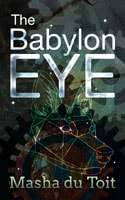
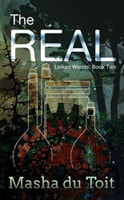
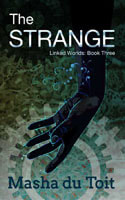
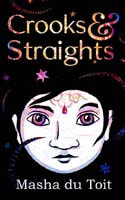
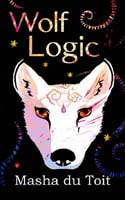
 RSS Feed
RSS Feed